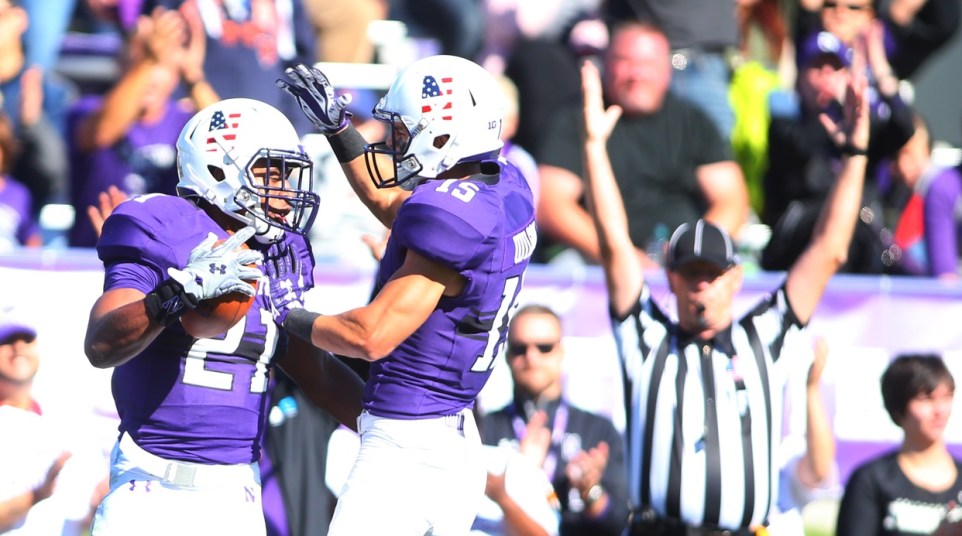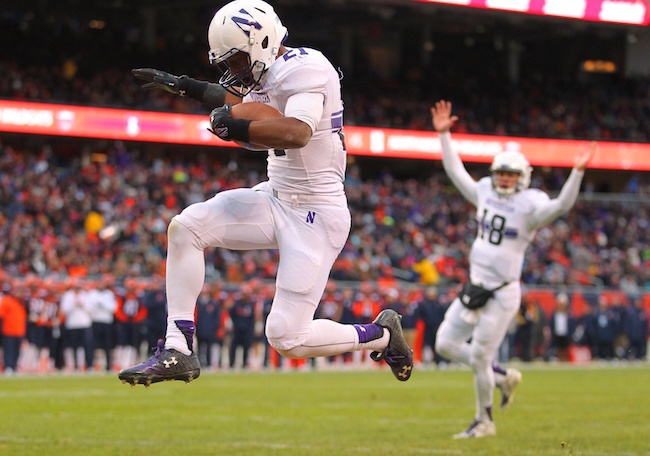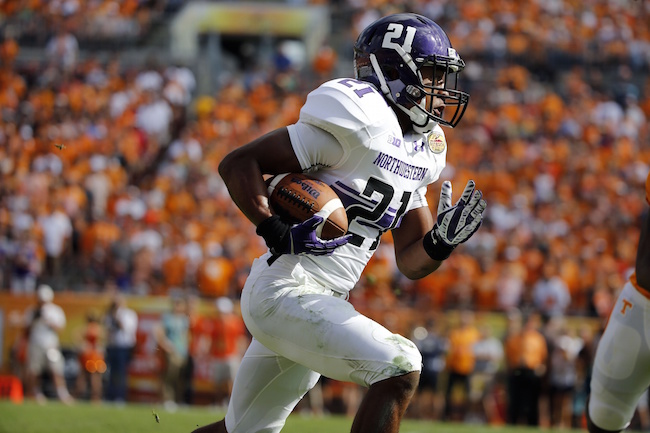Justin Jackson might not be a superhero, but he's worthy of national attention
CHICAGO — It’s definitely ironic.
Go down the list of Doak Walker Award watch list candidates on the official NCAA website. You’ll find 87 running backs listed, nine of which are from the B1G. There are guys who lack 1,000-yard seasons and plenty who are just underclassmen. Basically, if you were an FBS starting running back in 2015, you made the cut.
Justin Jackson was nowhere to be found.
Yes, the Northwestern tailback actually was on the watch list, but for whatever reason, he wasn’t among the 87 running backs listed. The NCAA made an omission on its website that still hasn’t been corrected nearly three weeks later.
It was fitting that Jackson was the one accidentally excluded. When it comes to national praise, he doesn’t seem to get it.
Never mind the fact that he’s the B1G’s leading returning rusher (by 342 yards). Never mind the fact that that he had just 94 fewer rushing yards in his first two seasons than Heisman Trophy candidate Dalvin Cook. Never mind the fact that in 2015, Jackson accounted for 37 percent of his team’s yards from scrimmage, which was more than any non-B1G quarterback.
Despite those accomplishments, it was teammate Anthony Walker who got the superhero treatment from the athletic department.
Northwestern knows that Jackson isn’t a household name across the country. Well, at least not yet.
“Nationally, it’s gonna start now,” said Northwestern coach Pat Fitzgerald. “He’s got a bullseye so it’s gonna be a challenge. But you go into your junior year, you’re gonna be a third-year starter, a potential All-B1G player, the number that he’s put up…I think this is his time to really have those types of things happen for him.”
For the record, Jackson’s abilities are mostly appreciated within B1G circles. The junior was named one of 10 B1G players to watch by the conference media. That followed a 2015 season in which he finished second in the conference in rushing behind Ezekiel Elliott.
But part of the lack of hype surrounding Jackson’s quick rise was because of backs like Elliott. In 2015, it was Elliott and B1G newcomers Jordan Howard and Saquon Barkley who overshadowed Jackson. In 2014, Elliott, Heisman Trophy finalist Melvin Gordon, Ameer Abdullah, Tevin Coleman, Jeremy Langford and David Cobb — all of them rushed for 1,500-plus yards and were NFL draft picks — overshadowed Jackson.
“We’ve had two pretty salty years here in this league of junior and senior running backs that are Doak Walker, Heisman Trophy candidate-type backs,” Fitzgerald said. “(Jackson) has to keep getting better and improve to put himself in that type of discussion.
“This is his time.”
Fitzgerald is right about that.
But besides the recent deep crop of B1G backs, why has Jackson been under the national radar despite rushing for back-to-back 1,000-yard seasons in his first two years in Evanston? After all, guys like Barkley are already nationally-known after one 1,000-yard season.
RELATED: Everything you need to know from Day 1 of B1G Media Days
It certainly isn’t because of a lack of work. Only Derrick Henry and Christian McCaffrey had more carries than Jackson did in 2015. But among the 53 players who ran the ball at least 200 times, Jackson had the worst carry-to-touchdown ratio at 62.4:1. And despite finishing the season with four straight games with a score, Jackson was stuck on one touchdown heading into mid-November.
The volume was there. The highlight-reel runs that other B1G backs became known for — Elliott, Barkley and Devine Redding put on a hurdling clinic — were not there. The “look-at-him-go” plays weren’t there, either.
Last year, Jackson had 10 runs of 20-plus yards. Compare that to Barkley, who had 14 runs of 20-plus yards with 58 percent of the carries that Jackson got.
That’s not where he earns his keep. Jackson hangs his hat on his ability to handle a substantial workload at just 190 pounds.
But breakaway touchdowns are nice, too.
“I’m hoping I can break some longer runs so that won’t need to be the case,” Jackson said. “Or maybe catching some passes out of the backfield. I’m trying to be more versatile, but if it comes down to carrying the ball 30 times, I’m down for that.”
Jackson didn’t register anywhere near that kind of volume in Northwestern’s losses. In the Wildcats’ three defeats against Michigan, Iowa and Tennessee, he had a combined 36 carries for 129 yards and a touchdown. As a result, Northwestern was outscored 123-16 (don’t ask Fitzgerald about that).
Sure, part of that was sub-par offensive line play and a redshirt freshman quarterback who was still developing as a passer.
But how much blame did Jackson put on himself?
“A lot,” Jackson said. “When we’re able to run the ball and I’m successful, our team is successful. It takes some pressure off the passing game and some pressure off our defense. In those games, that didn’t happen. You saw the result.”
RELATED: Fifty days from B1G football, here are 50 reasons to get excited
Northwestern is hoping to rely less on Jackson and avoid giving him the ball 30-plus times. Clayton Thorson’s second season under center will help. Utilizing return specialist Solomon Vault more at the skill positions could give Northwestern the home-run threat it desperately needs. Fitzgerald even moved defensive backs Marcus McShepard and Steven Reese to receiver.
As much as Fitzgerald wants Jackson to step into the clear-cut, first-team All-B1G tailback role and become a household name, the offense can’t ride on Jackson’s shoulders like it did in 2015.
“I don’t want him to feel like he has pressure on him because he just has to go out there and do what he’s been doing these last two years,” Northwestern cornerback Matthew Harris said of Jackson. “He’s athletic, his instincts are unbelievable and his vision is some of the best I’ve seen.”
Unbelievable instincts and impressive vision won’t necessarily turn the national spotlight on Jackson. That will, however, win Northwestern games. For now, that’s his only focus.
“Last year wasn’t good enough for me,” Jackson said. “Whether it’s being a top running back or whatever, I want to help my team win football games. If I can be better, then I can make that happen. That’s what it comes down to.”
There are obvious benefits that come with having one of the country’s top tailbacks. National TV games — something Northwestern still lacks — are more likely. Walking into the living room of a four-star running back recruit certainly becomes easier for Fitzgerald. And naturally, the more positive attention Jackson earns in the media, the more Northwestern’s stock climbs.
Fitzgerald admitted that the Wildcats need to do a better job of marketing Jackson and making sure he isn’t flying under anyone’s radar. It doesn’t matter if he was overshadowed in 2014 or in 2015. Jackson still has the second half of his career left to get the attention his body of work deserves.
This is his time.


